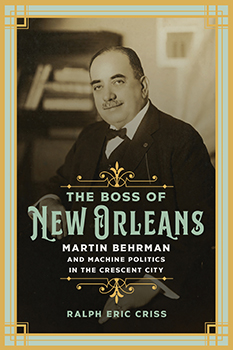
264 pages / 6.00 x 9.00 inches / 27 halftones
History / State & Local History | History / United States - Southern History | Political Science / Social Policy
Although relatively unknown today, Martin Behrman dominated New Orleans politics in the early twentieth century, serving as mayor from 1904 to 1920 and again in 1925 for a brief period before his death. His political organization—loosely referred to as “The Regulars,” “The Old Regulars,” or “The Choctaw Club”—was in complete control of the city during a period of rapid change. Behrman’s model of government, often called "Behrmanism" by detractors, was a pragmatic hybrid of machine politics, progressive reform, populism, and federalism that eventually found its way into Franklin Roosevelt’s New Deal and Huey Long’s political platform.
The Boss of New Orleans is a masterful examination of Behrman’s remarkable life and political career, during which he rose from the orphaned son of immigrant parents to the Crescent City’s undisputed leader. As mayor, he blended consensus building with the exercise of raw power in ways that few politicians of the era could match, allowing him to navigate numerous controversial events, including the implementation of national prohibition and the forced closure of Storyville, the city’s red-light district. Behrman successfully managed the city’s last epidemic of yellow fever and built new schools and infrastructure that moved New Orleans along the path of modernity, earning a reputation as a hard-working, detail-oriented manager of city and machine affairs. As Criss demonstrates, with the singular—and deeply troubling—exception of the disenfranchisement of Black voters, Behrman led an era of truly progressive change in the Crescent City.
Ralph Eric Criss holds a doctorate in history from Florida State University. He has been a staff member or consultant to Fortune 500 corporations and has worked on presidential, congressional, and gubernatorial campaigns.
“Progressive-era New Orleans mayor and Louisiana politico Martin Behrman is no Huey Long. And that is just the point of this engaging biography and wonderful political study of a machine politician who was also a progressive reformer. Behrman got things done for the city of New Orleans. Criss’s book is a terrific urban and political history.”—Gregory L. Schneider, author of Cadres for Conservatism: Young Americans for Freedom and the Rise of the Contemporary Right and editor of Conservatism in America since 1930: A Reader
Found an Error? Tell us about it.